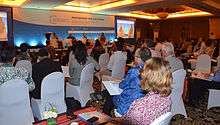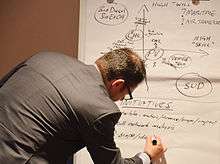SDSN-SEA
 | |
| Formation | 6 October 2013 |
|---|---|
| Type | Nonprofit organization |
| Purpose | Sustainable Development Solutions |
| Headquarters | Bali, Indonesia |
Region served | ASEAN |
Official language | English |
As part of UN Secretary-General Ban Ki-moon’s initiatives to promote sustainable development, UNSDN [1] was launched in 2012 to mobilize global scientific and technological knowledge on the challenges and set indicators for sustainable development goal,[2] including the design and implementation of the post-2015 global sustainable development agenda.
SDSN Southeast Asia Regional Hub (SDSN-SEA)
SDSN networks around the world are seen as a platform to promote and share sustainable development solutions that can be put into practice are crucial for the continue improvement for emerging economies in ASEAN in a way that minimizes negative impact on the environment, generates employment and inclusive growth, and helps to eradicate poverty.
SDSN-SEA and Indonesia was launched in October 2013 by the then President of the Republic of Indonesia, Mr. Susilo Bambang Yudhoyono with Prof Jeffrey Sachs, Director of the Earth Institute of Columbia University and Special Consultant of UN Director-General Ban Ki-moon, and the then Minister of Tourism and Creative Economy of Indonesia, and leadership council of SDSN Mari Pangestu and will be physically housed under United in Diversity Creative Campus being established in Kura Kura Bali. Currently SDSN-SEA is co-chaired by Cherie Nursalim.
2014 Regional Workshop (Partnership for Solutions)
First regional workshop join SDSN-SEA, SDSN Indonesia and SDSN Australia / Pacific host in Jakarta in 26–27 November 2014 and bring together leaders and experts from academia, government, business and civil society to discuss Indonesia’s future energy needs, identify how they can be met in line with decarbonizing the energy system to reduce greenhouse gas emissions and sustainable development, and to develop plans for collaborative solutions initiatives.

The regional workshop Main partner is the Ministry of Environment and Forestry of Indonesia[3] led by Minister Siti Nurbaya and being organized by University Indonesia Research Center of Climate Change, United in Diversity Forum (UID), the Monash University, in partnership with the Carbon War Room, the Australia–Indonesia Centre and the Harold Mitchell Foundation.
The regional workshop primarily focus to identify an economically, socially and environmentally sustainable future for Indonesia and how can progress towards achieving this can be measure, certain agenda such as how does the current UN proposal for the Sustainable Development Goals[4] in the areas of energy and decarbonization align with Indonesia’s needs. This will include developing ideas for collaborative research, demonstration, and strategic planning projects with participants that will lead to real outcomes. Who needs to be involved and how can we engage them.
Proposals/project(s) for future work including pledges of support.
Leaders and experts from academia, government, business from Indonesia, ASEAN region, Australia and Pacific propose future work and pledges support for various sustainability initiatives from Transportation, Deep decarbonisation, Urban development / Island development, Renewable energy to Sustainable Tourism and Energy.

UID-SDSN Award
UID-SDSN award[5] is an sustainaible initiative to encourage organisation across Indonesia to submit their solution which in line with United Nations sustainable goals and can demonstrate some initial success, also have the potential to be scaled up, adapted or replicated. 6 Finalist of selected solutions initiatives will receive assistance to share, scale-up and replicate their Sustainable Development Solutions and the winner will receive IDR 300 Million.
First UID-SDSN award finalists were announced at the Tri Hita Karana International Conference[6] on Sustainable Development at APEC on October 6, 2013, and the winner were a team from The Regency of Bojonegoro on “Community Road Paving” led by Kang Yoto[7]
UID-SDSN Indonesia award 2.0 were announced at SDSN SEA, Indonesia and Australia/Pacific workshop on the 26 November 2014 and shortlisted another 6 inspiring finalist from over 40 applicants across Indonesia, and they are:

Telapak Indonesia – “From illegal logging to community logging”[8]
- Initiative triggered by destructive impact of illegal logging in Indonesia, not only environmental but also social impact. Telapak Indonesia successfully transform illegal logger to green responsible community logger by combining Forest Stewardship Council (FSC) certification and community training.
Ibeka Foundation – “Sustainable community power energy using micro hydro project”[9]
- Established in 1992, IBEKA, is a social business entity with strong engineering background; with goal improving social economic condition of the rural community in remote areas by enabling them to have independent power supply through renewable energy.
Rachel House – “Palliative pediatric care for marginalized children”[10]
- Rachel House, or in Bahasa Indonesia "Yayasan Rumah Rachel" is a paediatric hospice, trained and develop home care team to provide pain management, spiritual and psychosocial support for children with late stage of cancer or HIV, allowing children with life-threatening conditions to receive the best care at home, should they wish to spend their last days there.
LSM Meaka Wakatobi – “Innovative Seaweed Farming”
- Wakatobi Regency located in an area of Southeast Sulawesi where a large area is a national park (Wakatobi National Park) and local people depend on tourism and fishery, Meaka Wakatobi regency introduce the "New Way to Seaweed Culture" by using seaweed cage to facilitate seaweed seed, resulting better seaweed harvest which creating new income source and improving economic aspect for local people and also overcome the coast environment degradation.
Misool baseftin – “Safeguard biodiversity thru community empowerment and utilising unmanned Aircraft System (UAS)” [11]
- Raja Ampat’s reefs lie at the epicenter of marine biodiversity, in the heart of the Coral Triangle, the region is home to 75% of the world’s known coral species, and close to 1,500 species of fish. Misool baseftin, organization based on Raja Ampat - Papua, use unmanned Aircraft System (UAS) solution for monitoring the large Marine Conservation Zones. Success at this project creates a fantastic opportunity to replicate in other key conservation areas all over Indonesia, marine no take zones, preventing illegal logging in protected forests, monitoring near shore fisheries and many other applications.
The UID SDNS award 2.0 winner "Planting the Seeds of Change" by The Learning Farm[12]
Established in 2005, The Learning Farm is a residential organic farm aim to empower vulnerable youth across Indonesia by giving them training and community development which occur in two phase (15 weeks each):
- Phase one: Life skill, vocational and entrepreneurial training
- Phase two: More individual and self-directed learning process
46% of graduates continue working in organic farming, 35% non-farm, 9% continue studies, with relatively small percentage of 6% still unemployed [13]
References
- ↑ "UN launches sustainable development network to help find solutions to global problems".
- ↑ "Indicators for Sustainable Development Goals" (PDF).
- ↑ "Ministry of Environment and Forestry of Republic Indonesia website".
- ↑ "UN proposal on Sustainable development goals".
- ↑ "United in Diversity SDSN Indonesia Sustainable Initiative Solutions".
- ↑ "Launch of SDSN SE Asia Network and UID Sustainable Development Award".
- ↑ "The winner of 2013 UID-SDSN Indonesia award, Community Road Paving from The Regency of Bojonegoro" (PDF).
- ↑ "Telapak Indonesia - Community Logging". Archived from the original on 2014-12-05.
- ↑ "Ibeka Foundation - Sustainable community power energy".
- ↑ "Rachel House – "Palliative pediatric care for marginalized children"".
- ↑ "Misool baseftin - Marine conservation foundation".
- ↑ "The Learning Farm-Planting the Seeds of Change".
- ↑ "The Learning Farm Programs".